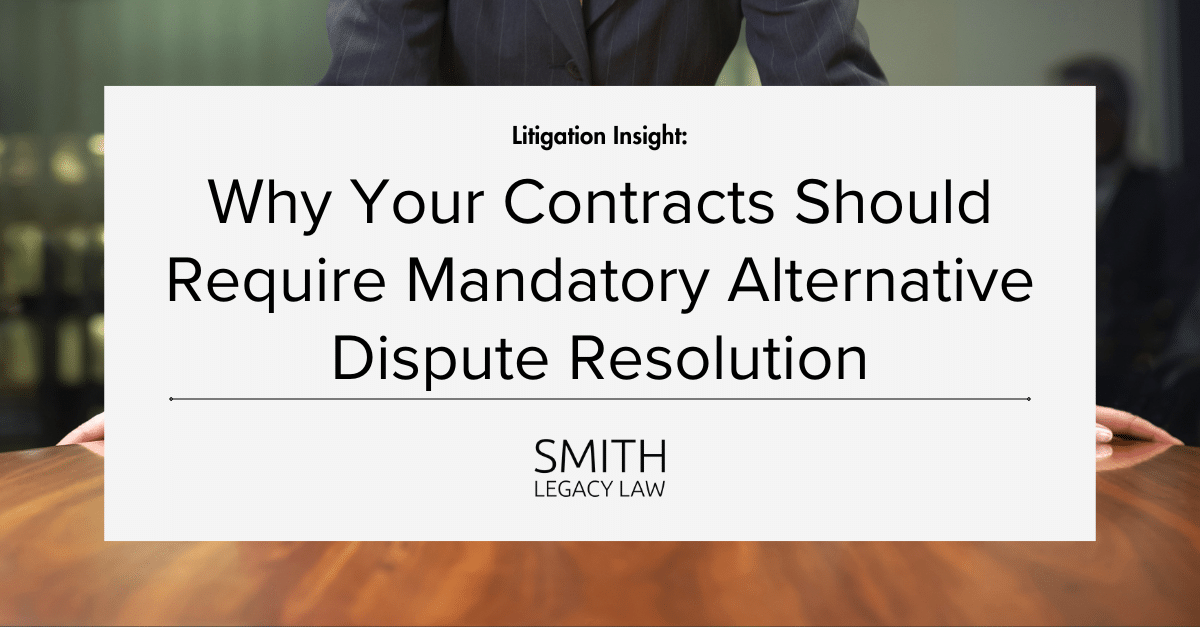Contractual disputes are sometimes unavoidable. While a well-drafted agreement can minimize the likelihood of conflicts, it’s best to plan for how to resolve disagreements without resorting to litigation. Going to court is time-consuming and expensive. Fortunately, there are other options that are cost-effective and efficient. Using a mandatory alternative dispute resolution provision in every contract can have a significant impact on reducing your legal expenses.
What is ADR, or Alternative Dispute Resolution?
Alternative dispute resolution or ADR typically refers to using mediation or arbitration to settle conflicts rather than litigation. Both methods occur out of court, are voluntary and private and employ a neutral third party.
In mediation, the neutral third party is known as the mediator. The mediator works with the parties to facilitate discussion and help the parties reach a mutually acceptable compromise. He or she does not make decisions or force the parties to settle.
Arbitration is an adjudicative process whereby a dispute is submitted to a neutral third-party arbitrator who will decide the matter. Typically, the arbitrator’s decision is binding on the parties and enforceable in court. Decisions are only subject to limited judicial review. The arbitration process is more formal than mediation but the parties have more control over the rules and proceedings than with litigation.
Notably, many organizations handle ADR, including AAA, FINRA, JAMS, and ICC. These organizations have well-defined rules and procedures and a wide variety of experts who can serve as mediators and arbitrators.
Why Is an ADR Provision Beneficial?
Litigation is often a slow and expensive process. Further, the courts control the proceedings with numerous rules and procedures that must be adhered to or a party risks dismissal or other consequences. In addition, judges may not have expertise with the parties’ industry or type of dispute. With ADR, the process is less formal and thus, usually faster. The parties can also establish many of their own rules. They can also select the neutral third party who will assist them with their dispute, including choosing someone with the appropriate expertise.
What Should Be Included in an ADR Provision?
The language of an ADR provision is important as there are opportunities to control when and how issues are resolved and discourage frivolous claims. Some key provisions include the following:
- Mandatory mediation first. Conflicts should go to mediation before arbitration. The parties should be required to mediate in good faith for some period of time – typically, 30 days – with the ability of the parties to extend the time by agreement.
- Arbitration follows if mediation fails. If the parties cannot come to an agreement with mediation, then the dispute should go to mandatory arbitration.
- Selection of neutrals and governing rules. The agreement can state that the parties will go to a particular organization and its rules will apply to the proceedings. Further, the parties can either choose from among the organization’s mediators or arbitrators or allow the organization to make the choice.
- Recovery of attorney’s fees. Arbitrators can be given the authority to award costs, including attorney’s fees, to the prevailing party. This is important as it can reduce the likelihood of frivolous claims, defenses, and counterclaims.
Mandatory ADR clauses offer significant benefits by minimizing the costs and delay associated with resolving disagreements. However, these provisions should be carefully drafted. In addition, if a conflict does arise, it is just as important to have skilled representation in an ADR proceeding as with litigation. We advise clients regarding contract drafting and provide strategic guidance and advocacy in the event of contract disputes.
Contact us to discuss how we can help your business.
